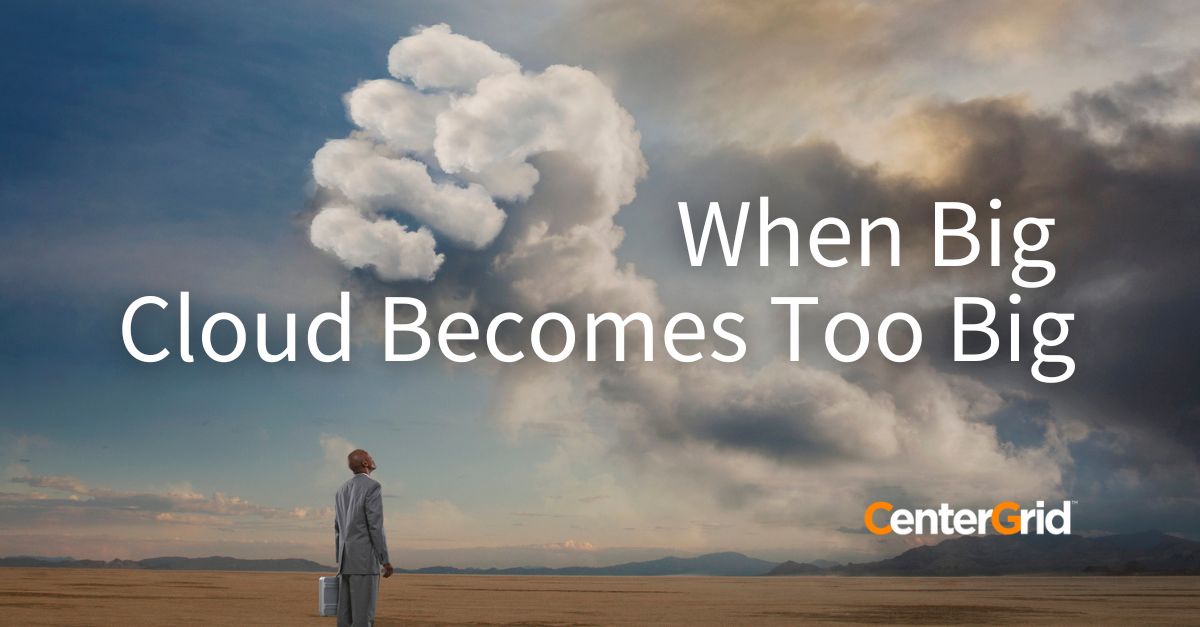For a long time, AWS and Azure have been the default choices for companies moving to the cloud.
They offer huge scale, global reach, and a long list of services that sound impressive in every boardroom. But more IT leaders are realizing those benefits often come with a steep price tag and a lot of hidden frustration. If your workloads are steady and you value predictable costs and personal support, it might be time to consider a private cloud partner like CenterGrid instead. Here’s how to think about it.
Hyperscalers Sell Flexibility You Might Not Need
The big public clouds are built for companies that need to spin up thousands of servers across multiple continents at a moment’s notice.
That level of elasticity sounds great, but most mid-market and enterprise workloads are more predictable. You probably know roughly how many virtual machines you need each month. Paying premium “on-demand” rates for capacity you don’t actually scale up or down is like buying a fleet of sports cars when you only need a reliable sedan.
Think of a typical ERP system or a set of customer-facing web applications. These workloads don’t change dramatically day to day. Yet when you pay hyperscale rates, you’re effectively subsidizing the infrastructure required for organizations that do need to expand and contract instantly. A private cloud provider designs infrastructure around your actual usage so you’re not covering the cost of someone else’s infinite runway.
With a private cloud, you can still scale as needed, but you scale within a framework built for consistency. That means your monthly costs match what you truly use, not the hypothetical spikes that might never happen.
The Hidden Costs Add Up Fast
Every IT leader who has stared at an unexpected cloud invoice knows the feeling.
With hyperscalers, you’re billed for every gigabyte leaving the environment, every database read, every backup snapshot, and even idle resources you forgot to turn off. Data egress fees alone can spike your bill in ways that are hard to predict. Move a few terabytes of data out of AWS to another provider or back on-prem and you might see charges that rival your entire compute spend.
This unpredictability creates headaches for budgeting. Finance teams can’t plan accurately because one month’s invoice might look nothing like the next. Even diligent IT managers can be surprised when an application’s usage pattern shifts slightly and costs double overnight.
Private cloud providers typically offer transparent monthly pricing with no surprise line items. You know the number before the month starts, which makes budgeting far easier and avoids that end-of-month sticker shock. If you need to expand capacity, you negotiate the change up front and know exactly what it will cost. That level of clarity is worth a lot to any organization trying to manage both technical performance and financial discipline.
Support Matters More Than You Think
When something breaks, you want a human who knows your environment and can fix the problem quickly.
Enterprise support plans on the big platforms often cost a percentage of your entire spend and route you through layers of ticketing before you reach a senior engineer. Even with those pricey support tiers, you might find yourself explaining the same details to multiple representatives before someone with the right skills acts.
A private cloud company lives or dies by customer relationships. Providers like CenterGrid usually include 24/7 access to experienced engineers who already understand your setup. That means less time explaining and more time resolving issues. When you call, you reach someone who is familiar with your configuration, your workload patterns, and your priorities.
This level of service can prevent extended downtime and reduce the internal stress on your own IT team. Instead of burning hours documenting problems and chasing tickets, your team can focus on strategic projects while knowing that expert help is only a phone call away.
Let’s Meet in the Middle
The public cloud has its place.
If you’re Netflix or a global gaming company with unpredictable traffic patterns, you need hyperscale elasticity and a worldwide network of data centers. But most organizations are not Netflix. They need reliability, cost visibility, and a partner who will pick up the phone when things get tough.
A private cloud provider delivers exactly that while eliminating the surprise bills and the sense that you’re paying for someone else’s scale. You still get the benefits of virtualization, dedicated resources, and secure infrastructure, but without the financial whiplash or the endless maze of self-service dashboards and hidden fees.
If you’re feeling squeezed by your current cloud bill or tired of chasing down support tickets, it might be time to break up with the big clouds. Take a hard look at what your workloads really require.
You might discover that a private cloud like CenterGrid fits not only your technical needs but also your budget and your sanity. Choosing a private cloud partner means reclaiming control – over your infrastructure, your costs, and your ability to focus on what truly matters to your business.

